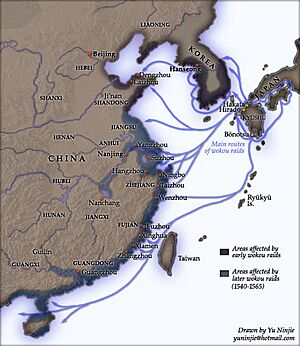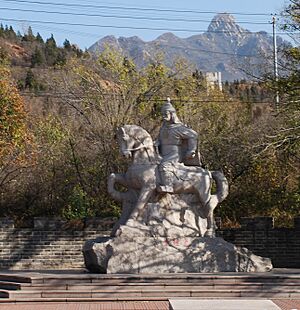Qi Jiguang facts for kids
Quick facts for kids
Qi Jiguang
|
|
|---|---|
| 戚繼光 | |
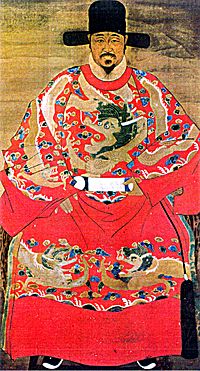
Portrait of Qi Jiguang
|
|
| Born | November 12, 1528 Luqiao, Jining, Shandong
(now Luqiao Town, Weishan, Jining) |
| Died | January 17, 1588 (aged 59) |
| Other names |
|
| Occupation | General |
Qi Jiguang (Chinese: 戚繼光; pinyin: Qī Jìguāng, November 12, 1528 – January 17, 1588) was a famous Chinese military general and writer. He lived during the Ming dynasty. General Qi is best known for two big achievements. First, he protected China's coast from pirate attacks in the 1500s. Second, he helped make the Great Wall of China stronger.
Qi Jiguang also wrote important books about military strategy. These books, like Jixiao Xinshu and Record of Military Training, shared his knowledge. He is remembered as a hero in Chinese history.
Who Was General Qi Jiguang?
A Young Leader's Beginnings
Qi Jiguang was born in 1528 in Luqiao, a town in Shandong province. His family had a long history of serving in the military. His ancestors were brave leaders who fought for the emperor. Because of their service, Qi Jiguang's family was given a special hereditary role. They became commanders of the Dengzhou Garrison, a military district.
Qi Jiguang's father, Qi Jingtong, was a skilled fighter and a respected general. Growing up, Qi Jiguang loved everything about the military. He would build small forts from clay and pretend to be a commander. He played war games with his friends, showing his leadership from a young age.
When his father passed away, Qi Jiguang took over as commander of Dengzhou Garrison. He was only 17 years old. He worked hard to improve the navy defenses there. He also led his troops to defend against Mongol raiders near Beijing between 1548 and 1552.
At 22, Qi Jiguang went to Beijing for a special military exam. During this time, Mongol forces attacked Beijing. Qi Jiguang helped defend the city. He showed great courage and smart planning, helping to defeat the invaders.
Protecting China's Coasts from Pirates
In 1553, Qi Jiguang was given a new mission. He became an Assistant Regional Military Commissioner in Shandong. His job was to defend the coast from "wokou" pirates. These groups were not just Japanese. They often included Chinese members and built bases on land. They raided cities for many years.
When Qi Jiguang took command, his army was in poor shape. Many soldiers were old or weak, and others had left. The troops lacked training and discipline. The defenses were also falling apart.
Training a Strong Army
Qi Jiguang knew he needed a new kind of army. He decided to recruit miners and farmers from Yiwu county. He believed these people were honest and hardworking. He trained them with new methods and strict discipline. He also built 44 new naval ships to fight pirates at sea.
In 1555, he wrote a poem called Written on Horseback. It described his life of constant service:
南北驅馳報主情,
江花邊月笑平生.
一年三百六十日,
多是橫戈馬上行.
Galloping north and south to serve my lord with loyal heart,
Flowers and moon in frontier smile at my life apart.
Three hundred sixty days a year,
All spent with sword in hand, on horseback, without fear.
Victories Along the Coast
Qi's new army faced its first big test in 1559. They fought a month-long battle against wokou pirates in Taizhou. Qi's army won a great victory, and the pirates suffered heavy losses. This win made Qi's army famous.
After this success, pirate attacks increased in Fujian province. In July 1562, Qi Jiguang led 6,000 of his best troops to Fujian. Within two months, they destroyed three major pirate strongholds. His army did suffer some losses from fighting and illness.
The pirates returned to Fujian, capturing a city called Xinghua. In April 1563, Qi Jiguang led 10,000 troops back to Fujian. They recaptured Xinghua and continued to win battles. Over the next year, Qi Jiguang's army finally solved the pirate problem in Fujian.
In 1565, Qi Jiguang joined forces with another general, Yu Dayou. They fought a big battle on Nan'ao island. Together, they defeated the last major group of combined Japanese and Chinese pirates.
Guarding the Northern Border
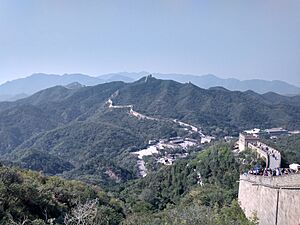
After dealing with the pirates, Qi Jiguang was called to Beijing in 1567. His new job was to train the imperial guards.
For many years, Mongol groups had been a threat along China's northern border. In 1550, a Mongol leader named Altan Khan had even attacked Beijing. In 1571, the Ming dynasty made a peace agreement with Altan Khan. However, other Mongol groups still tested China's defenses.
Reinforcing the Great Wall
The next year, Qi Jiguang was put in charge of troops in Jizhou. His mission was to defend against the Mongols. He oversaw major repair work on a long section of the Great Wall. He also directed the building of over 1,000 new watchtowers along the wall. This greatly improved the northern defenses.
Military Training and Defense
In the winter of 1572, Qi Jiguang led a huge military exercise. More than 100,000 troops took part. Based on what he learned, he wrote the Records of Military Training. This book became a very important guide for future military leaders.
During the early 1570s, a Mongol leader named Dong Huli often invaded Ming territory. Qi Jiguang's troops defeated them many times. They even captured Dong Huli's younger brother. Dong Huli later came to Qi Jiguang to surrender. He promised never to invade Jizhou again.
General Qi's Last Years
Qi Jiguang had a powerful friend named Zhang Juzheng. After Zhang Juzheng passed away, Qi Jiguang faced difficulties. In 1583, he was removed from his duties. His wife left him, and he spent his final years in hardship and poor health.
He passed away on January 17, 1588.
General Qi's Lasting Impact
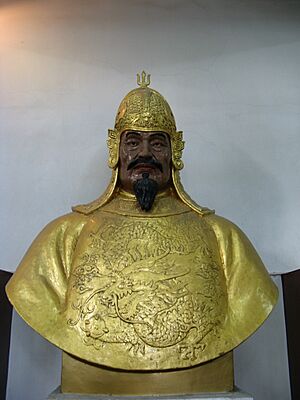
His Important Books
Qi Jiguang wrote down his ideas and experiences in two main military books. These were the Ji Xiao Xin Shu and the Record of Military Training. He also wrote many poems and essays. He collected these writings in a book called the Collection of Zhizhi Hall.
A Special Pancake and Honored Ships
A type of hard pancake called guangbing (光餅) was named after Qi Jiguang. It is also known as kompyang in some parts of Southeast Asia.
Two ships have also been named in his honor. These include the Republic of China Navy frigate Chi Kuang (FFG 1105) and the People's Liberation Army Navy training ship Qi Jiguang.
See also
 In Spanish: Qi Jiguang para niños
In Spanish: Qi Jiguang para niños
 | Isaac Myers |
 | D. Hamilton Jackson |
 | A. Philip Randolph |


